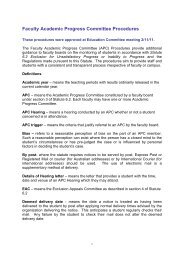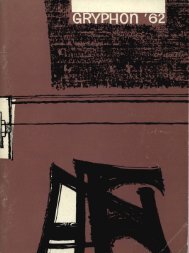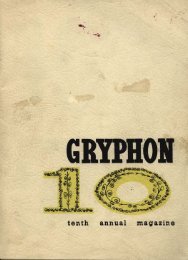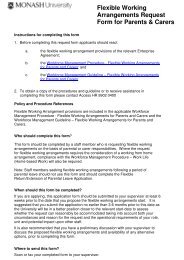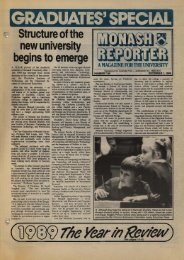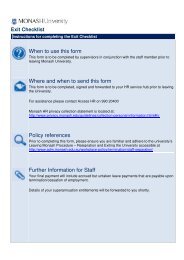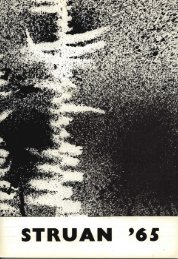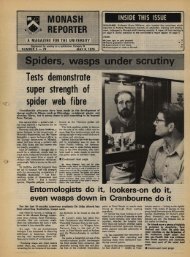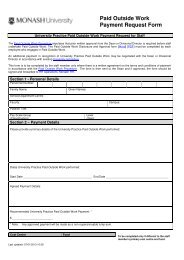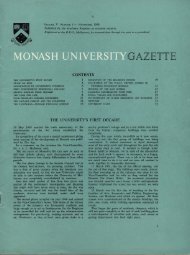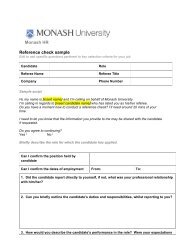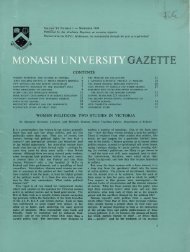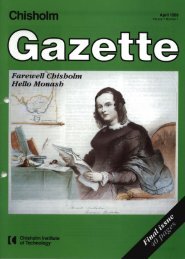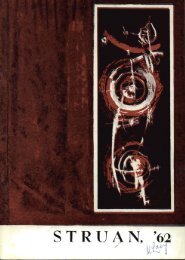No.3-81 May - Adm.monash.edu.au - Monash University
No.3-81 May - Adm.monash.edu.au - Monash University
No.3-81 May - Adm.monash.edu.au - Monash University
- No tags were found...
Create successful ePaper yourself
Turn your PDF publications into a flip-book with our unique Google optimized e-Paper software.
The word in transport in the '80s is 'dere<strong>au</strong>la!ion', but • • • •Liner shipping retnalns anchored to the 'conference system' talked to ReporterDr Keith Trace. whobefore goin~ onWhile the trend in the 1980& may he toward deregulation in domestic road, ran and air and international air transport,there i. one form - liner ihlpplng - which i. highly regulated and can he espected to remain 80. leave. asks: :AreAustralia ~ best interests served?' Liner ships carry Australia's import/exportof general cargoes.The regulation of liner shipping is imposedby the ship owners through what isknown 8S the conference system and hasbeen supported by successive AustralianGovernments since the 19309.What has been termed the"stranglehold" of the conference system,while largely accepted, has not gone completelyunchallenged, particularly in thelast 10 or so years. In fact it has becomevery much a "live" issue among the largerAustralian shippers such as the Wool Boardand the Australian Meat and LivestockCorporation.One of the few Australian academicsworking in the area of shipping economicsis Dr Keith Trace. senior lecturer in<strong>Monash</strong>'s Economic History department.Grigor ReportDr Trace questions whether Australia'sinterests an best served by the conferencesystem which operatee on every importantmulti·owner trade route out of the country.At very least he believes we ahould examinethe poasibilities opened up by VariOU8stages of deregulation - 80mething theGovernment appears not to have done byaccepting the recommendations of theDepartment of Transport'8 lateet (1978)study, "Report on a Review of OverseasCargo Shipping Legialation" (the GrigorReport).His belief is that Australia's economic in·terests would be better served by a morecompetitive system than the conferencespermit.Dr Trace explains the nature of shippingconferences:"A conference is a cartel, or associationof owners servicing a particular trade route,formed to protect its members' interests bylimiting competition between member linesand by countering outside competition, to<strong>au</strong>gment profits and to provide regularsch<strong>edu</strong>led. services."Conferences determine freight ratelevels and may allocate sailings, allot a setshare of available cargo to member linesandlor operate a revenue poolingagreement. "Conferences can be "open" or "closed".Open conferences - which are confinedalmost exclusively to trade routes radiatingfrom >the United States - impose norestriction on entry other than that of requiringa new member to charge postedfreight rates and observe conference rules.In contrast, lines can only join a "closed"conference with the consent of existingmembers.Dr Trace says: "The strength of a can·ference lies in its power to ensure shipperloyalty and thereby to exclude outside competition."To encourage loyalty, conferences in·variably adopt either a contract (dual rate)or a deferred rebate system, giving 'loyal'customers - those who agree to shipspecified cargoes solely by conference vessels- the benefit of lower freight rates."Dr Trace says that a major determiningfactor in liner conference freight rates is anhistorical 'rule-of-thumb estimate of "whatthe traffic can bear." Rates vary from commodityto commodity.Raie changes are made on an across-the·board basi •.It baa been argued that conference lin ..make little effort to minimise coate butmerely p888 them on to the end·uaers on acost-plus basis, as is possible in amonopolistic situation.Support for the conference system hascome from the Australian Government and,historically, from shippers themselves.Arguments in its favour are that it offers arationalisation of shipping services withstable freight rate8 and regularity insailinp. This rationalisation, it is argued,would be destroyed in tbe competitiveenvironment.In 1930 amendments to the IndustriesPYeservation Act opened the way for theAustralia to Europe Shipping Conferenceto ' close its membership and enter intodual-rate contracts with shippers.The shipping provisions of the TradePractices Act, introduced in 1966 andamended in 1971 and 1974, built on thestructure embodied in the Australian IndustriesPreservation Act, giving all out·ward conferences the right to close theirmembership and use dual-rate contracts.subject to the safeguard that they undertaketo negotiate with designated and ap·propriately constituted shipper associationsand that they have due regard to the"adequacy, economy and efficiency" of ser·vices.The recent Grigor Report "continues theAustralian tradition", in Dr Trace's words,by giving> support to the status quo onclosed shipping conferences. He 'Says thatthe Report was a "lost opportunity" for a~eeper probe into the nature of liner shippmg.His own view is that Australia ha, "givena lot ~way" by permitting closed conferencesto operate.Alternative policiesThe alternative policies, which hebelieves the Government should at leastconsider, are these:• The "halfway house" of encouraging asomewhat greater degree of competitioneither by legislating to replace closed byopen conferences and/or by encouraging>outside lines to enter a trade.• A move directly to A more competitiveenvironment through the introduction oflegislation to ban conferences and/or outlawconference practices such as the dualratesystem.According to Dr Trace the evidencesuggests that routes served by "open con·ferences" tend to be characteriHd by ex~cesa shipping capacity."On the other hand," he says, "thepresence of a price-cutting independent ina trade served by a 'cloeed' conference mayserve to keep the conference boneat. In a.world where second best rules lIuch asituation may be the beet attainable."He says that a government intending tomove in the freely competitive directionwould face intense lobbying from industrypressure groups, and he concedes that thereare valid objections to "trust busting" inshipping (several inquiries in the UK andthe US have concluded that unfetteredcompetition would be unlikely to lead to acontinuing and reliable service).This is what Dr Trace predicts would occurin the competitive situation:"In the absence of conferences, shipswould continue to be placed on berth frequently,although sailings would probablynot be on 80 regular a basis at present.Freight rates would be less stable than theyhave been under the conference system andthere is the possibility - though not in myjudgment the probability - of severe temporaryfluctuations in tbe level of rates.These fluctuations would, however, takeplace about a mean that would be lowerthan that of conference rates."Dr Trace says that one of the weaknessesin the Government's policy on conferencesis the belief that the powerful ranks of shipowners have a countervailing power in theform of a shippers' organisation.In practice, he says, the Australian Shippers'Council has been no match for theship owners who hold the balance ofbargaining power.For a start, he says, the shippers havenever been as united as the ship owne18.The larger commodity boarels, thOle cover·ing wool and meat for example, have beenprepared to negotiate separately to gain ad·vantage.Traditionally the ASC has supported theclosed conference system, favoring its pricereliability and service regularity.But Dr Trace says that, in the harshereconomic climate of the last 10 years,freight rates have begun to bite and it hasbeen these larger boards that havespearheaded questioning of the system.A catalyst in raising the shippers'awareness of the value of competition hascome in the form of the Belgian line, ABCContainerline.To date, independents (which, of course,have freedom of the seas and the right todock) bave posed Iittled threat bec<strong>au</strong>sethey have not been able to guarantee theirpresence, with a reliable service, over time.But with a long term contzact on anAustralian-American route 8S "security",.-'\Be is for the first time, offering a forceful,non-socialist and viable independent alternativeon the European route.Its marketing is aggre8sive. "Get adivorce, or at ,least a trial separation," theline's advertisements run. "If your profitmargins are suffering from high freightrates, you may be using the wrong shippingline. At ABC ContainerHne you'll find competitiverates which will r<strong>edu</strong>ce yourfreighting costs and add to your profita."Some of the large commodity boardshave swung their weight to transport partof their cargoes with the independent linewhile retaining contract rates with the conferenceliners.Shippers, in their new mood, madestrong representations recently to theGovernment which was planning to take uprecommendations of the Grigor Report inan amendment to the Trade Practices Act.The shippers argued that the amendmentswould strengthen the position of shipowners. The Bi1l has been shelved - per·manently, Dr Trace believes.Dr Trace points to shipping policy 88 asource of potential conflict between theUnited States and Australia.He says the countries take a differentphilosophical approach in which there is"real potential for clash."Current US legislation ensures that conferencesoperating to and from US portsmust be open to all ship owners wishing tojoin, subject only to financial. guaranteesand proof of ability to offer regular services.This "to~' aspect of operati9n8, as well 88"from", cuts across Australia's claim thatit has sole jurisdiction over movementa outof its ports.US legislation also requires that the USFederal Maritime Commi88ion approveconference agreementa (taking into accountthe criteria of anti-trust Acta) and con·tracts between conferences and theircustomers. Also it prohibits the deferred.rebate system.Going further, the US Department ofJustice has argued that the FMC has failedto properly administer the Shipping Actand that shippers' interests would be betterserved under an openly competitive systemwhich would lead to lower prices, greaterconsumer choice and more efficient allocationof resources. The Justice Departmentis currently threatening to investigate USAustralian shipping.ABC plans 'Degrees of Change' If you think you've been seeing Austr.li.n .ctor-director Bud Tlngwell ro.ming .round the c.mpulI.tely - you',. right.Bud hal been epending • lot of time INking out <strong>au</strong>ltabte k)c.tiOni for Ie,"" that the ABC TVdrama unit propo ... to Ihoot .t MOOIIh for • forthcoming production - OevrNI of Chllng••Filming for whIt i, IXpected to be the pilot .paode of I m.Jor televllion HTi.. will t.ka plac<strong>edu</strong>ring tht v.eetion. in the l'lt week of <strong>May</strong>.Mr Tingwetl. who il directing the production. II Men herl in the Union discuuing aapectl of theICriI)t wtth. from left: M..-garet McCluaky. acript editor: Carol_ , ...... ARiatant to the Warden ofthe Union; Max N~. deaigner; Glendli Byrne. _ltant director: and ~ Oott. MonnhStudent ThNtre Co-ordinator.For 101M of the ICIMI. the ABC IxpectI to amptoy up to 30 ttudlnt ed,..._.,., •MONUM II.POIlnIl



